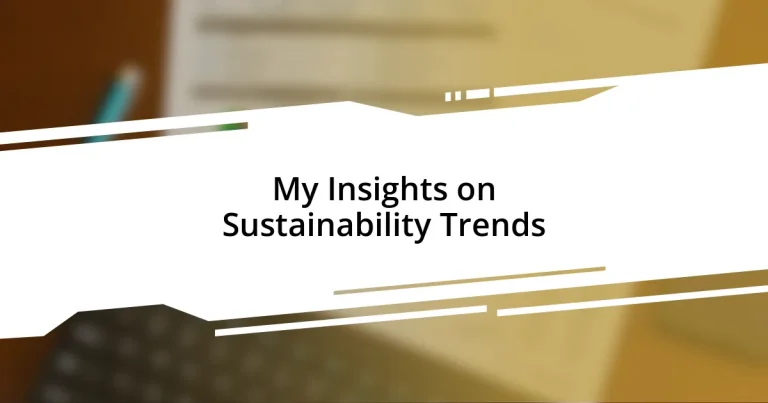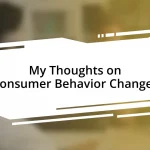Key takeaways:
- The shift towards circular economies emphasizes reusing resources, leading to more sustainable consumer habits.
- Technological innovations, like smart meters and electric vehicles, are crucial for reducing carbon footprints and enhancing sustainability.
- Consumer behavior is increasingly aligned with eco-friendly practices, particularly among younger generations advocating for sustainable choices.
- Corporate responsibility initiatives are building trust and fostering community engagement through environmental stewardship and transparency.
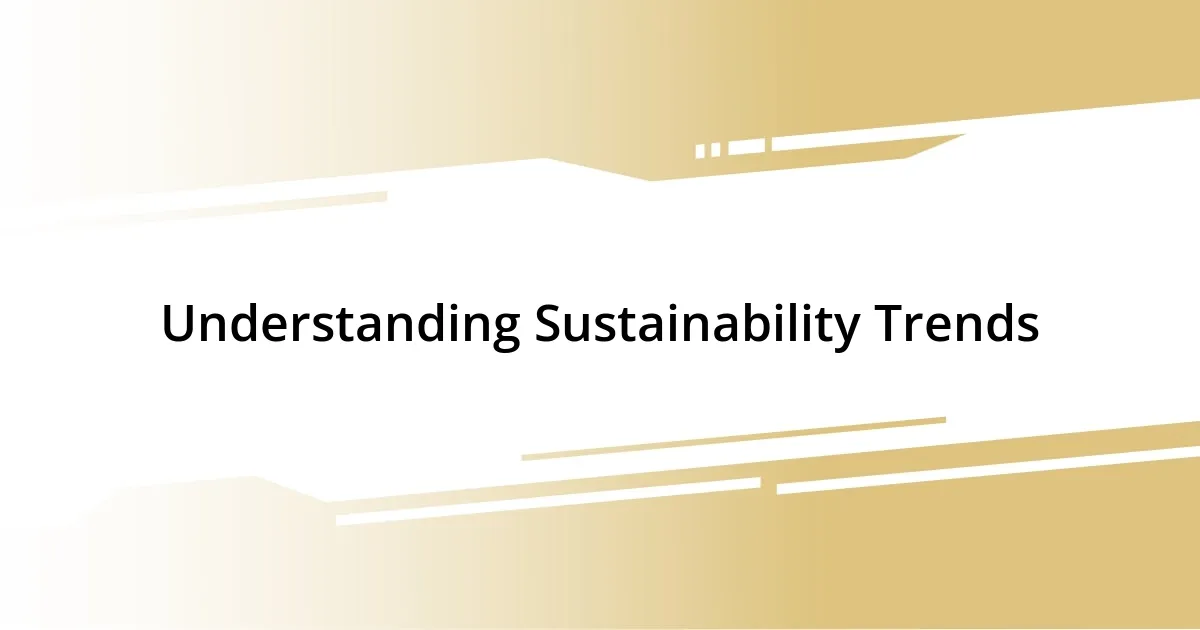
Understanding Sustainability Trends
Sustainability trends are not just buzzwords; they reflect a growing awareness of our impact on the planet. I remember sitting in a café, overhearing a conversation about how consumers are shifting towards eco-friendly products. It struck me then how much our choices can shape industries. How often do we consider the ripple effect of buying a sustainable product?
One trend I’ve noticed is the shift towards circular economies, where the focus is on reusing resources rather than discarding them. It made me think about the clothes I buy—am I truly investing in pieces that will last, or am I just contributing to a cycle of waste? Engaging with this notion has transformed how I shop and perceive value. It’s an eye-opener, isn’t it?
Moreover, the rise of green technology offers hope for a more sustainable future. Whether it’s solar panels or electric vehicles, these advancements excite me. It feels empowering to know that innovation can lead us toward a healthier planet. Isn’t it inspiring to think about the possibilities when we commit to integrating sustainability in our daily lives?

Current Global Sustainability Practices
Sustainability practices around the globe are evolving, driven by the need to address pressing environmental challenges. One practice that stands out to me is the increasing adoption of regenerative agriculture. I recall my visit to a local farm that uses these methods—seeing the vibrant ecosystems they’ve nurtured was nothing short of inspiring. It made me realize how farming could not only feed us but also restore our planet.
- Carbon farming: Techniques to capture and store carbon in the soil.
- Water conservation methods: Using technologies that minimize water waste.
- Diversity in crops: Encouraging a variety of plants to enhance resilience and nutrition.
Another fascinating trend is community-driven sustainability initiatives. It’s heartwarming to see neighborhoods banding together to create urban gardens and promote public transport. I remember participating in a local clean-up event; the camaraderie and commitment among people were palpable. Such grassroots movements highlight how collective action can lead to substantial environmental improvements.
- Local advocacy groups: Mobilizing communities to push for sustainable policies.
- Shared transport systems: Carpooling and bike-sharing programs reducing carbon footprints.
- Plastic waste reduction campaigns: Initiatives encouraging the use of reusable materials.
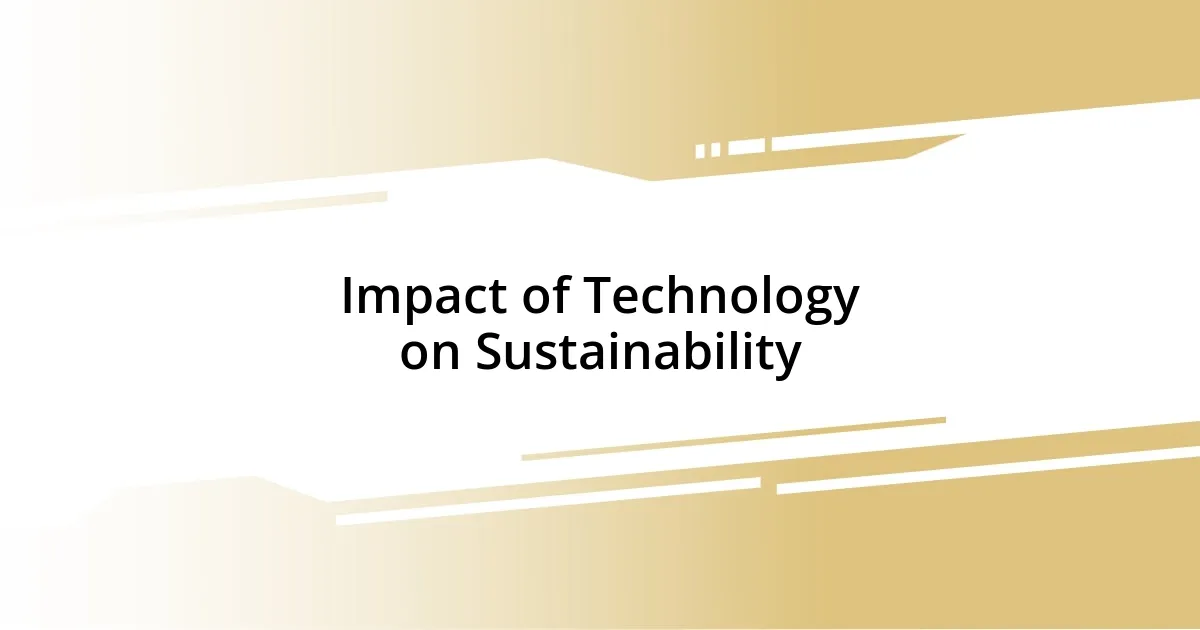
Impact of Technology on Sustainability
The impact of technology on sustainability is profound, reshaping how we approach environmental issues. I vividly remember the first time I saw a solar farm; it was like stepping into a future I had only read about. The technology harnessing the sun’s energy to power homes and businesses made me think deeply about our reliance on fossil fuels and the potential for a cleaner energy source. Isn’t it exciting to realize that such advancements can drastically reduce our carbon footprint?
In my experience, smart technologies are revolutionizing resource management. For instance, smart meters help homeowners monitor their energy consumption, prompting more mindful usage. I’ve been using one myself, and it’s incredible how small changes, like adjusting the thermostat, can lead to significant savings. You could say it’s like having a personal sustainability coach right in your home!
Innovative transportation solutions also play a crucial role in promoting sustainability. Electric vehicles (EVs) are becoming more accessible, with charging stations popping up in every corner. I recently took a road trip in an EV, and it was liberating to know I was contributing to a greener planet while traveling. As I drove past traditional gas stations, it struck me how technology could redefine our approach to mobility and emissions.
| Technology | Impact on Sustainability |
|---|---|
| Solar Energy | Reduces dependency on fossil fuels and lowers greenhouse gas emissions. |
| Smart Meters | Promotes energy conservation by providing real-time usage data to consumers. |
| Electric Vehicles | Decreases air pollution and fossil fuel use in transportation. |
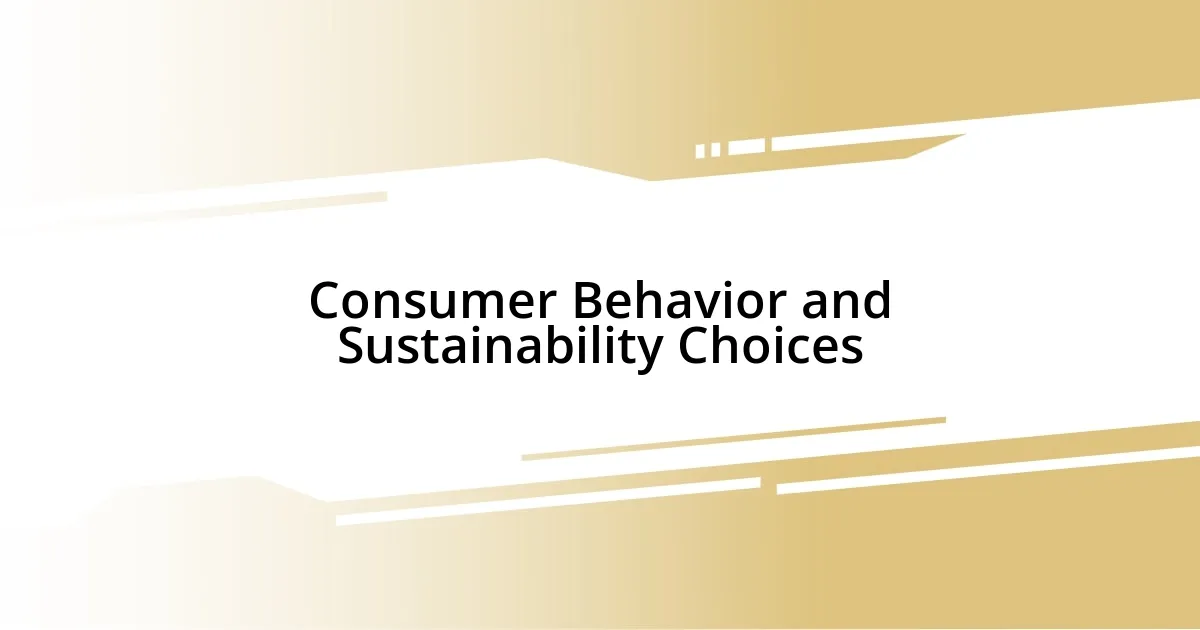
Consumer Behavior and Sustainability Choices
Consumer behavior is moving toward sustainability, driven by greater awareness of environmental issues. Every time I browse the aisles of my grocery store, I notice how many shoppers gravitate toward eco-friendly products. It makes me wonder: has the tide truly turned? When we choose items with minimal packaging or certified organic labels, we’re not just buying a product; we’re advocating for a healthier planet.
What strikes me about this shift is how millennials and Gen Z are leading the charge. I recently attended a workshop on sustainable living, and it was inspiring to see young people passionately discussing their choices. They value brands that align with their values, and social media plays a crucial role in amplifying these messages. It’s a vibrant community where sharing ideas and experiences leads to collective accountability. Have you ever felt uplifted by a friend’s sustainable choice? It’s contagious!
Ultimately, the change isn’t just about the products; it’s about a lifestyle. I’ve begun to look at my consumption patterns critically, especially in terms of fast fashion. The last time I cleared out my closet, I was shocked by the number of items I bought on impulse. That experience led me to embrace sustainable fashion brands and thrift shopping, which not only feels good but also supports reuse. It’s incredible how conscious choices can transform not just our wardrobes but also our impact on the planet.
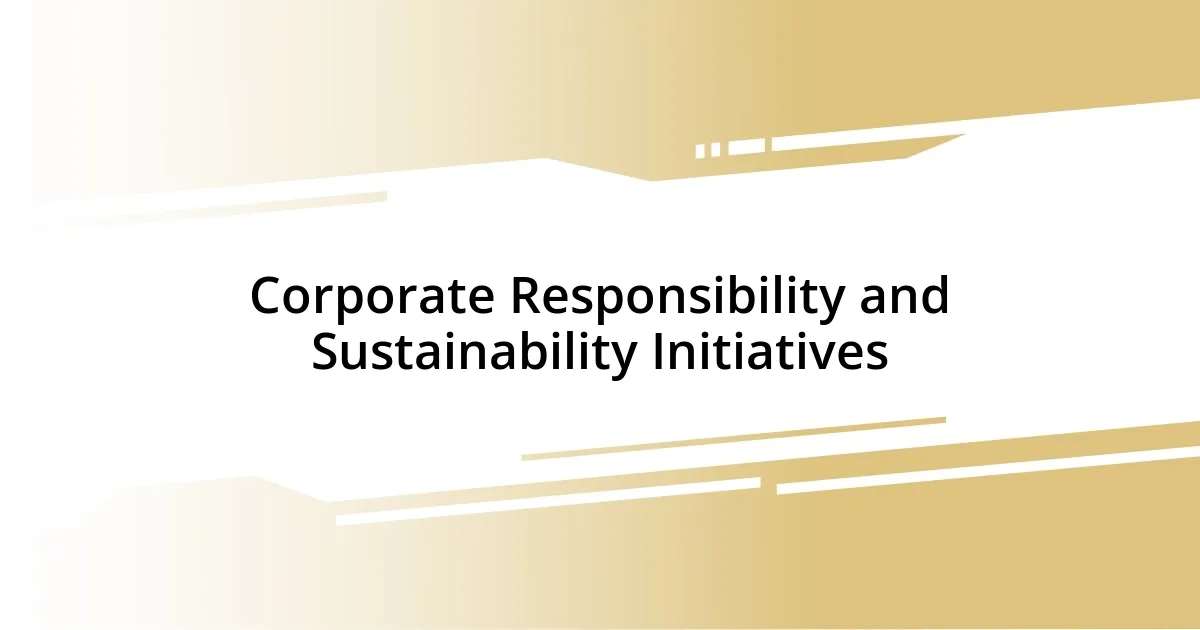
Corporate Responsibility and Sustainability Initiatives
Corporate responsibility is becoming a hallmark of sustainable business practices. I recall attending a corporate sustainability summit where the CEO of a major brand passionately discussed their zero-waste initiative. It struck me how deeply these efforts resonate with consumers today. When companies commit to reducing waste and improving supply chain transparency, they foster trust and loyalty among their clients. Isn’t it remarkable how a single initiative can change public perception?
Moreover, many organizations are investing in community engagement programs that focus on education and environmental stewardship. I remember volunteering with a local non-profit where we planted trees to restore a community park. The smiles on children’s faces as they learned about the importance of trees and biodiversity made it clear that corporate initiatives can go beyond profit. When companies actively involve themselves in local projects, it creates a ripple effect of positive change. Why not become a part of that movement?
Finally, I find it inspiring when businesses take bold steps, such as committing to carbon neutrality by a specific year. For example, I follow a brand that pledged to eliminate their carbon footprint by 2030. Their transparent reporting on progress always keeps me engaged. I think about how my purchasing decisions can align with these companies striving for sustainability. Isn’t it empowering to know that as consumers, we can support organizations that prioritize our planet’s well-being?
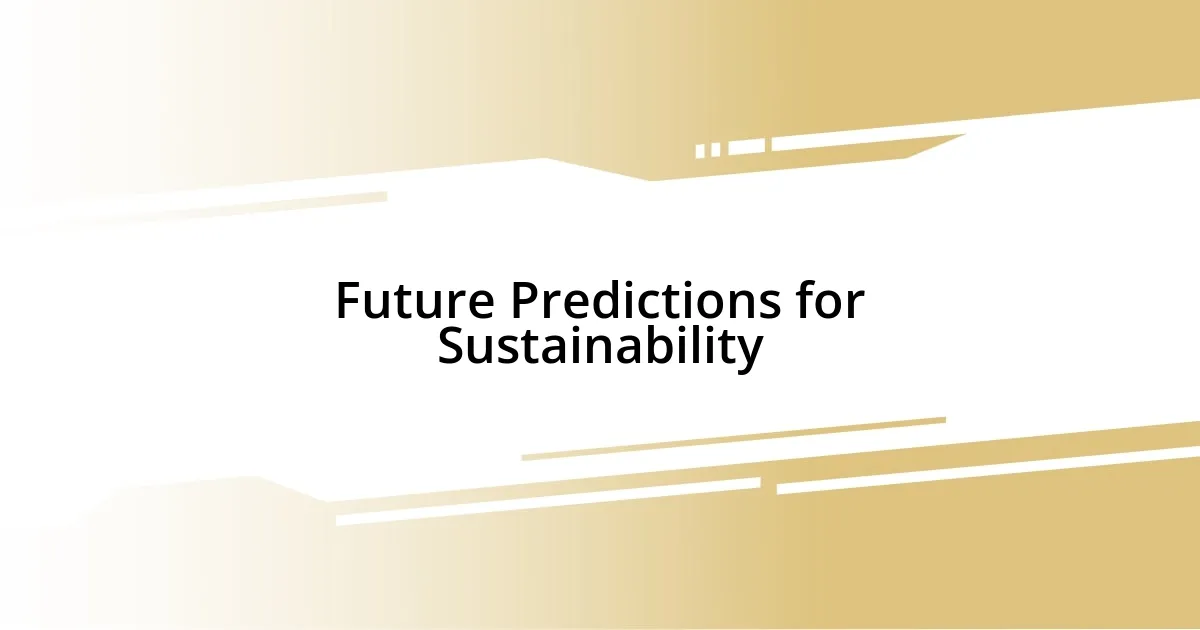
Future Predictions for Sustainability
As I envision the future of sustainability, I can’t help but feel excitement about the increasing integration of technology in eco-friendly practices. For instance, I’ve seen firsthand how smart home devices can drastically reduce energy consumption. Imagine managing your home’s energy use just by using your smartphone – it’s not just convenient, it’s crucial for our future. Will technology be the key to unlocking a more sustainable lifestyle?
I also believe that the future will see a significant rise in circular economies, where nothing truly goes to waste. I remember attending a local workshop on upcycling, where participants transformed old furniture into beautiful decor pieces. It struck me then; this is more than just a trend—it’s a necessary shift in how we value materials. As people begin to see the potential in reused products, we might redefine what “new” really means.
It’s fascinating to think about how legislation will increasingly influence sustainability efforts. Looking back, I can recall moments when a new policy sparked substantial change in my community. For example, after my city implemented stricter recycling regulations, I noticed a dramatic increase in local recycling rates. The power of policy not only shapes business practices but also influences consumer behavior. Isn’t it exciting to imagine being part of such impactful change?
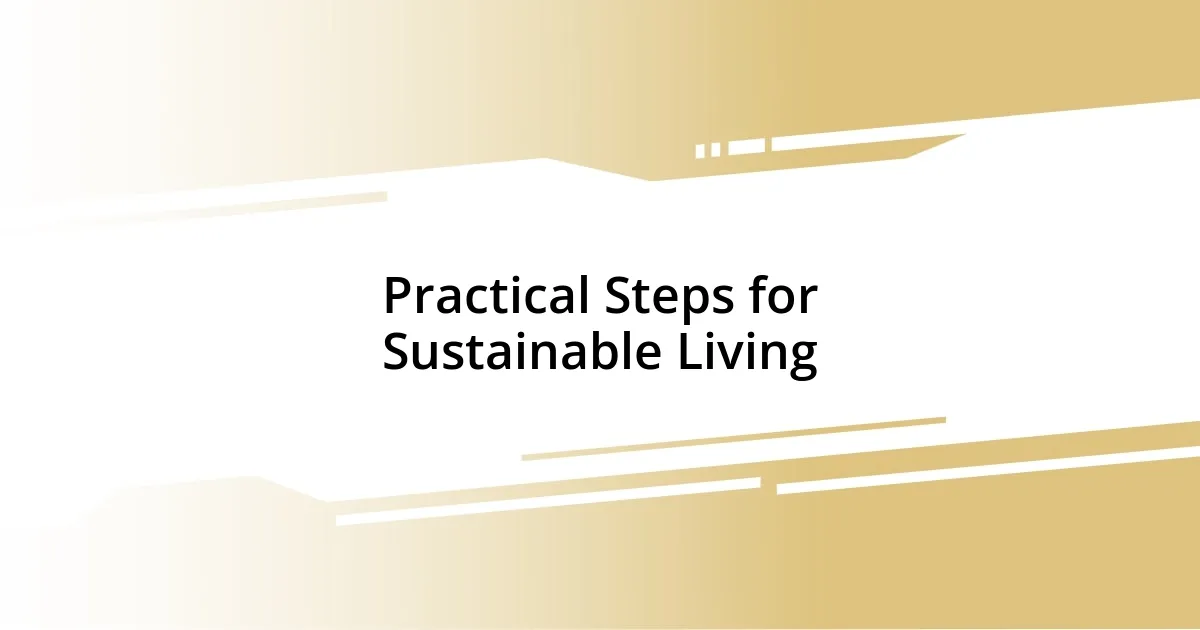
Practical Steps for Sustainable Living
Embracing sustainable living starts with small, everyday changes. I remember the first time I switched to reusable bags. It felt incredible to be part of a movement that reduces plastic waste, and I found it surprisingly convenient to carry my groceries in sturdy, stylish bags. Have you ever thought about how something so simple can make a big difference?
Food choices also play a crucial role in sustainability. A few years ago, I committed to local and seasonal eating. I joined a community-supported agriculture program, and it’s been a delightful journey. Each week, opening my box of fresh produce feels like a gift from nature. It not only supports local farmers but also minimizes carbon footprints. Isn’t it rewarding to know that the food on your plate supports your community?
Another powerful step is reducing water usage at home. I installed low-flow showerheads and made a habit of shorter showers. Initially, it felt like a sacrifice, but over time, I found innovative ways to be quicker while still enjoying that refreshing feeling. Plus, seeing my water bill drop was an unexpected bonus! Don’t you think that being mindful of our resources can lead to surprising rewards?












